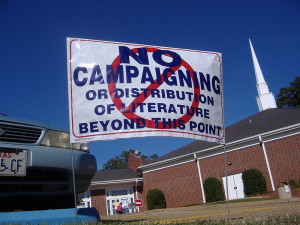 WASHINGTON — The Internal Revenue Service (IRS) has reached a settlement with a prominent atheist organization, agreeing to crack down churches and religious groups for infringements of its prohibition against ‘electioneering.’
WASHINGTON — The Internal Revenue Service (IRS) has reached a settlement with a prominent atheist organization, agreeing to crack down churches and religious groups for infringements of its prohibition against ‘electioneering.’
As previously reported, the Freedom from Religion Foundation (FFRF), headquartered in Madison, Wisconsin, sued the IRS in 2012, asserting that many non-profit religious organizations have been “blatantly and deliberately flaunting … electioneering restrictions,” but the government has not enforced its rules pertaining to the matter.
According to the IRS website, “Under the Internal Revenue Code, all section 501(c)(3) organizations are absolutely prohibited from directly or indirectly participating in, or intervening in, any political campaign on behalf of (or in opposition to) any candidate for elective public office. The prohibition applies to all campaigns including campaigns at the federal, state and local level. Violation of this prohibition may result in denial or revocation of tax-exempt status and the imposition of certain excise taxes.”
However, while candidates may not be promoted or opposed, churches and ministries that obtain 501 (c)(3) status may speak out on political and moral issues and/or generally encourage others to vote.
“Under federal tax law, section 501(c)(3) organizations may take positions on public policy issues, including issues that divide candidates in an election for public office,” the IRS outlines. “However, section 501(c)(3) organizations must avoid any issue advocacy that functions as political campaign intervention. Even if a statement does not expressly tell an audience to vote for or against a specific candidate, an organization delivering the statement is at risk of violating the political campaign intervention prohibition if there is any message favoring or opposing a candidate.”
In its lawsuit against the IRS, the Freedom from Religion Foundation cited a number of specific complaints regarding those that it believes violated these rules. The atheist organization said that it filed 27 complaints with the IRS and alleged that none were ever investigated. FFRF then asked the court to force IRS Commissioner Doug Shulman “to authorize a high-ranking official within the IRS to approve and initiate enforcement of the restrictions of §501(c)(3) against churches and religious organizations, including the electioneering restrictions, as required by law.”
According to reports, the IRS had received a similar 0rder in 2009, but did not follow through. Now, in settling with FFRF, it has adopted procedures in regard to church investigations and non-profit groups in general.
While the investigations currently are on hold as the IRS is investigated itself by Congress, FFRF states that it is happy with the settlement.
“This is a victory, and we’re pleased with this development in which the IRS has proved to our satisfaction that it now has in place a protocol to enforce its own anti-electioneering provisions,” said FFRF Co-President Annie Laurie Gaylor.
However, Alliance Defending Freedom (ADF), a Christian legal group that organizes “Pulpit Freedom Sunday” each year to challenge the regulation, says that the IRS code at issue is unconstitutional.
“For almost the first 200 years of America’s history, pastors frequently spoke out with great boldness about the great moral and social issues of the day and about the candidates running for office,” ADF outlines on its Speak Up Movement website. “Yet today, the voice of the Church has been silenced by the Johnson Amendment – an unjust and unconstitutional law.”
“Pastors should decide what they preach from the pulpit, not the IRS,” added Senior Legal Counsel Erik Stanley. “It’s outrageous for pastors and churches to be threatened or punished by the government for applying Biblical teachings to all areas of life, including candidates and elections. The question is, ‘Who should decide the content of sermons: pastors or the IRS?’”
Photo: Kushal One
Become a Christian News Network Supporter...


